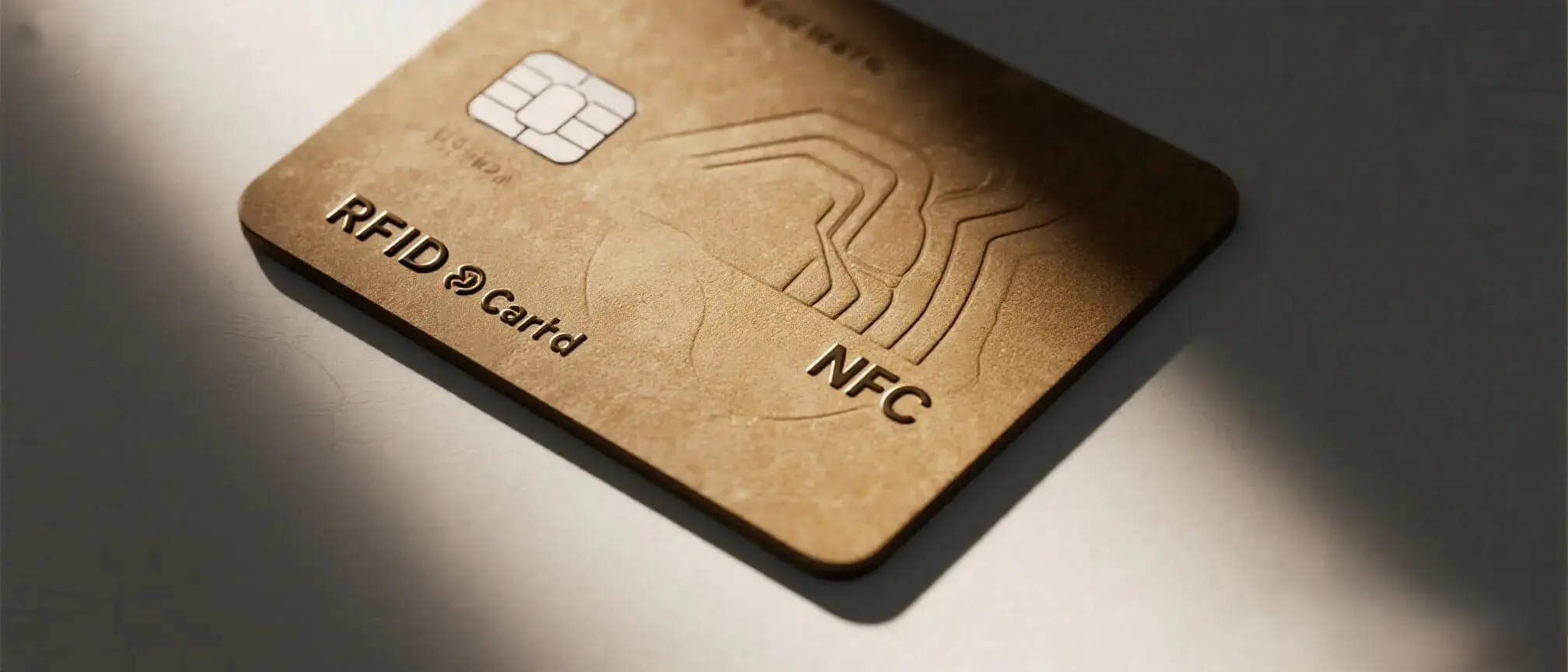Environmental Costs of Traditional RFID Cards
23,000 Tons of Electronic Plastic Waste Annually
The global RFID industry produces a staggering 23,000 tons of electronic plastic waste yearly, equivalent to the weight of 15,000 passenger cars. Traditional RFID cards, primarily made of non-biodegradable PET plastic, take 450+ years to decompose in landfills, leaching toxic additives into soil and water. A UN Environment Programme report warns that without intervention, RFID-related e-waste could surge by 35% by 2030, driven by retail and logistics adoption.
Heavy Metal Chip Contamination
Conventional RFID cards contain heavy metals like lead and cadmium in their chip solder, posing severe environmental risks. When improperly disposed, these toxins infiltrate soil and groundwater, contaminating ecosystems and entering the food chain. A study by the University of Michigan found that 1 square kilometer of landfill soil near electronic waste sites contained lead levels 12 times the safe limit, directly linked to RFID and smart card disposal.
Average Lifespan of Only 2 Years
Despite their environmental footprint, traditional RFID cards have an average functional lifespan of just 2 years. Frequent replacement cycles—driven by wear, technological obsolescence, or rebranding—exacerbate waste. The retail sector alone discards over 5 billion RFID tags annually, with 92% ending up in landfills rather than recycling facilities.
Less Than 15% Recycling Rate
RFID cards face abysmal recycling rates, with only 12% of global production being recycled. The complex composition of plastic substrates, metal antennas, and chips makes separation costly and technically challenging. Most recycling facilities lack the infrastructure to process RFID cards, leading to 88% being incinerated or landfilled—releasing greenhouse gases and toxic fumes.
Revolutionary Breakthroughs in Eco-Friendly Materials
Plant-Based Biodegradable Card Body
ECO RFID Cards, such as those developed by HUAYUAN RFID, utilize a corn starch and PLA (Polylactic Acid) composite that achieves 90% biodegradation within 180 days in industrial composting conditions. This plant-based material replaces petroleum-derived plastics, reducing carbon emissions by 62% during production. Independent lab tests confirm the card body completely decomposes into CO₂ and water, leaving no microplastic residues.
Pollution-Free Chip Encapsulation
The breakthrough lies in the detachable eco-solder and heavy metal-free chip design. Manufacturers like Avery Dennison Smartrac use tin-silver-copper (TSC) solder alloys free from lead, mercury, and cadmium. The chip module is engineered for easy separation during recycling, allowing 85% of electronic components to be recovered and reused—dramatically reducing e-waste.
Practical Application Solutions
Green Event Management
For short-term events like conferences and festivals, ECO RFID Cards offer a game-changing solution. After the 2024 Paris Olympics, which used over 1.2 million compostable RFID tickets, 91% of cards were collected and composted, diverting 2.3 tons of plastic from landfills. The cards’ data is securely uploaded to the cloud before decomposition, ensuring event analytics are preserved while materials return to nature.
Circular Logistics Systems
In supply chains, ECO RFID tags integrate seamlessly with organic packaging. Amazon’s Sustainable Logistics Program reports that using SparTag biodegradable RFID cards reduced packaging waste by 40%. These tags degrade alongside food waste in composting facilities, eliminating the need for manual separation and enabling true end-to-end sustainability.
Perfect Balance of Eco-Friendliness and Performance
Maintains 3-5 Meter Reading Distance
Despite their sustainable design, ECO RFID Cards deliver performance comparable to traditional tags. Field tests show a read range of 3-5 meters using UHF technology, sufficient for inventory management and access control. The paper-based antenna, developed by Avery Dennison, achieves 98% of the sensitivity of copper antennas while reducing production energy use by 70%.
Weather Resistance: -20℃ to 60℃
ECO RFID Cards withstand extreme temperatures from -20℃ to 60℃, making them suitable for outdoor applications. Accelerated aging tests simulating 5 years of exposure show minimal performance degradation, with read rates remaining above 95%—meeting the durability requirements of logistics and hospitality industries.
Cost Only 8% Higher Than Traditional Cards
While initial costs are 8% higher than conventional RFID cards, the total cost of ownership is lower due to waste reduction incentives and recycling savings. Starbucks reported a 12-month ROI after implementing ECO RFID Cards, driven by reduced waste disposal fees and positive brand perception among eco-conscious customers.
Industry-Leading Application Cases
2024 Paris Olympics Electronic Tickets
The 2024 Paris Olympics deployed ECO RFID Cards for all event tickets, eliminating 15 tons of plastic waste. The cards, printed with vegetable-based inks, doubled as souvenirs and were compostable at home. Post-event surveys showed 94% of attendees supported the sustainable ticketing initiative, boosting the Olympics’ green reputation.
Amazon’s Sustainable Logistics Label Program
Amazon’s adoption of ECO RFID tags reduced packaging-related carbon emissions by 28,000 tons annually. The tags’ ability to biodegrade in standard composting facilities aligned with the company’s goal of net-zero carbon by 2040. Pilot programs in Europe showed a 35% increase in customer satisfaction due to visible sustainability efforts.
Starbucks Membership Card Green Upgrade
Starbucks’ switch to ECO RFID Cards resulted in 1.2 million fewer plastic cards in circulation yearly. The PLA-based cards degrade within 6 months in home compost bins, and customers earn bonus points for returning used cards for industrial composting. This initiative contributed to a 15% increase in loyalty program sign-ups among environmentally conscious consumers.
Future Sustainable Development Blueprint
Solar-Powered Self-Sustaining RFID
Emerging research focuses on integrating thin-film solar cells into ECO RFID Cards, enabling battery-free operation. Prototypes developed by MIT generate 5μW of power under indoor lighting, sufficient for low-frequency data transmission. This technology could extend card lifespans to 5+ years while maintaining biodegradability.
Mycelium Substrate Material Research
Companies like Ecovative are pioneering mycelium-based RFID substrates, using mushroom roots to create durable, compostable card bodies. These organic substrates offer 30% higher impact resistance than PLA and can be grown in molds, reducing manufacturing energy use by 45%. Pilot production is set to begin in 2025.
Blockchain Traceability for Degradation Processes
Blockchain technology will soon track ECO RFID Cards entire lifecycle, from production to decomposition. Each card will have a unique digital twin recording material sourcing, manufacturing emissions, and composting data. Consumers can scan the card to view its environmental impact, fostering transparency and accountability in sustainable supply chains.
As the world grapples with plastic pollution, ECO RFID Cards represent a pivotal shift toward sustainable technology. By combining plant-based materials, pollution-free manufacturing, and high performance, these cards prove environmental responsibility and functionality can coexist. With industry giants like Amazon and Starbucks leading adoption, the ECO RFID Card is poised to set a new global standard for sustainable tech.
Why Choose Mytopband?
- Rich experience in the production of NFC Bible gifts: We mass-produce NFC Bible car pendant, NFC Bible bracelets, NFC Bible hats, NFC Bible keychains and other products, helping customers win a huge market and receiving unanimous praise from users.
- Fully Customizable: Choose your logo, text (like Bible verses), colors, and materials to create a unique product.
- Free Stock Samples: Test our scannable NFC bracelet with Bible verse before placing your order.
- Low MOQ as 500pcs: Perfect for startups and small businesses.

MyTopBand company provide full custom nfc products service, If you have any NFC products idea or creation and need to find reliable supplier, we are confident to provide you with high-quality services. Please find us: www.mytopband.com, or send message to info@mytopband.com, we will reply you within 24 hours.

